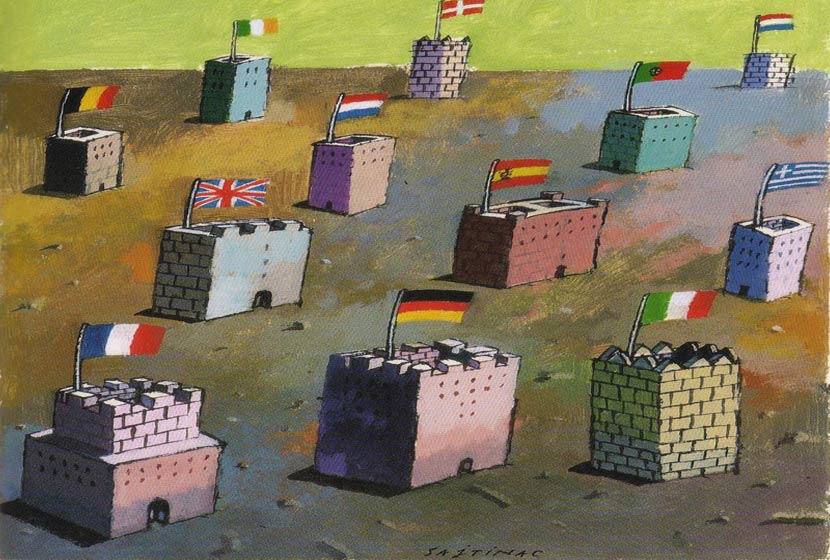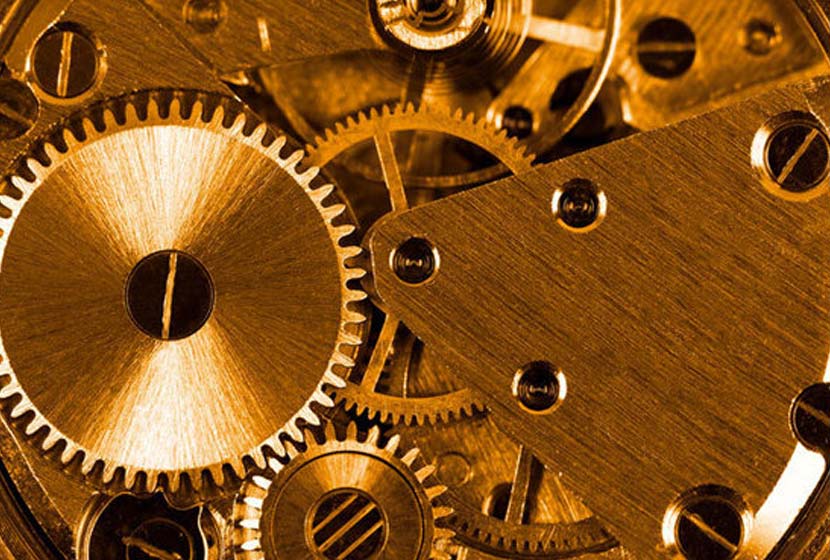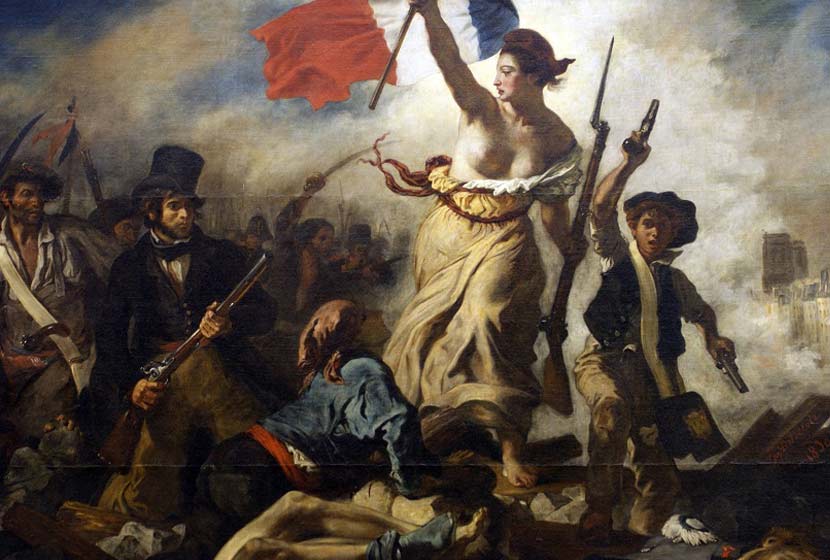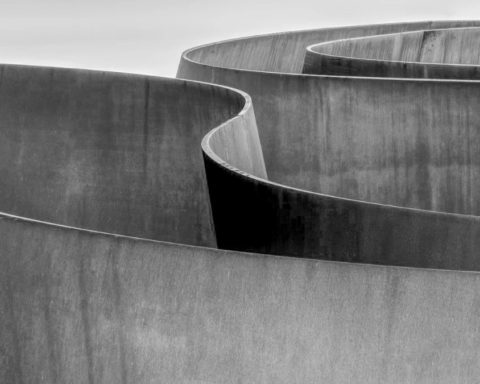What kind of society can thrive by just passing the signs that go through it? All circulation tends to dissolve representations, therefore meaning, doesn't it?
What society can prosper from the systematic conservation of the signs that pass through it? All conservation tends to fossilize representations, and therefore meaning, right?
Today, legacies - those carried by the vehicles of modernity: speech, art, writing, measurement - are rather mishandled in the West. A West in constant physical and psychic expansion. At the same time, other legacies are perhaps insufficiently shoved elsewhere, "elsewhere" that feel left behind, either powerless or threatening. In either case, the instrumentalization of time is relatively excessive: it leads, in the first case, to the destruction of signs without ensuring their renewal and, in the second case, to their sacralization and de facto prohibition of their renewal. Most contemporary human societies live, in fact, under the influence of a kind of denial of the excess that one of these two forms of instrumentalization of time carries with it: here, the deficit of meaning and common questions; there, the excess of meaning and common questions; a denial of excess and a denial of its main consequence: this dangerous fracture between the West and "its elsewhere", a psychic and political fracture at least.
We are talking about "long time" of course, and when we point out "the history of long time", we think of Fernand Braudel! For my part, when I focus on the "long history of Europe", it is with Jean-Baptiste Duroselle that I look for inspiration. Duroselle told the story of Europe, the history of its peoples, and he made it clear that one of the major characteristics of Europe was that between God and Caesar, neither of the two defeated the other, that Europe as a whole escaped Caesaropapism - in long time! - and that this characteristic emerged at the very heart of the struggle between popes and emperors, which lasted from the 10th to the 13th centuries. So Europe had...and God and Caesar, who then rather "neutralized" each other, leaving a formidable imaginary space for a "neither God nor Caesar". In other words, for the most part, this battle between these two fundamental forms of worship had no winner, and so creative freedom - and the culture of diversity that accompanied it - took its place.
The municipalities in Europe, these countless hotbeds of diversity that are the municipalities, hotbeds of very variable size, illustrate this well. They have been the most fertile and resistant guarantees against the puffs of Caesaropapism, against God or against Caesar, depending on the case and the moment. They have helped to produce, in a learning process that is fortunately always conflictual, the "subsidiary public spirit" and its associated political technology, perhaps the finest and most effective that men have ever invented to bring about affirmative difference and cooperative integration.
Modern Europe was the invented fruit of all these inter-active dynamics. So, prints, postures, accents, funny traces?
The fate reserved for those who, between the 13th and 15th centuries, suffered the consequences of the stigmatizing practices that gradually spread throughout the Iberian peninsula, perhaps allows us to speak of a "Marrano precondition". It would be appropriate to question these very first repressive manifestations of religious identity: could they constitute one of the first groundswell of the construction of modern Europe, one of its founding, proto-historical events?
What if "the first and successive Marrano conditions" between the 16th and the end of the 19th centuries, against the background of a Caesarized Church (with the paroxysm of the Inquisition) and monarchies of divine right (with their imperial paroxysms), were to be understood as important markers of a slow, long and dense mirror-experience of the still religious invention of... coming out of religion?
Europe is the only human group that has conquered the whole world (except Japan and most of China), and has therefore massively exported its political violence. And yet, the Europe of political violence, whether expeditionary or not, has nevertheless left room for "habeas corpus" and "human and citizens' rights". It is, in fact, the only human space that has engendered two human rights revolutions, the English and the French, and inspired a third, the American one, to impose its "taste for self-government".
Europe is a human group that has conquered Heaven by having populated it almost everywhere with a single God and then "managing" it schismatically afterwards, by attaching its subjects to rigid and deadly identity postures. And yet, the Europe of religious violence has nevertheless left room for equivocity, or even for a feeling of pity?
Now, the very possibility of individual and collective freedom, but also equivocity or pity, could not have emerged if God had prevailed over Caesar or Caesar over God. What if the "marranes" had been too obscure vectors or reflections of such a possibility? What if, moreover, the persistence of such postures still carries a coherent message today?

What about today, then?
The Marrano was confronted with the permanent challenge of responding at any time to an identity-based house arrest since each of the possible expressions of this assignment referred to a subjection: former Jew, new Christian, future Jew or future false Christian. Now, are not we contemporary Europeans also the heirs of those "inthées" of immanence as well as of those atheists and agnostics whose relationship to transcendence was paradoxically so fruitful, contributing to the creation of centres of kaleidoscopic cultures without excessive culturalization?
Cultures, marranial counter-cultures? In generational dynamics, could we speak of Marran "counter-culture"? Or rather series of cultural antidotes to the excessive "cultualizations" of the moment, as so many clearly uncertain answers to the question of truth, both religious and political truth? Doesn't the profusion of possible funny situations and postures make it possible to draw up a figure of tight landmarks, weaving a fabric of a possible universal history of Europe?
To put oneself in danger, to think against oneself, to go for a vaccination or inoculation, to affirm the courage of the hypothesis, to take charge of the freedom to betray the clerics, to wrest one's ideas from Heaven: a spirit of creation in all its facets to resist for centuries to the gravity of Earth's hourly gravity?
By travelling again and again through the space of Europe, the marranes have perhaps curiously given authority... to time, to the time of modernity in Europe. To assert the authority of time is to say, like Myriam Revault d'Allonnes, that time does not authorize anything a priori if it is not the fruit of a succession of authors. Because, without authors, there is no temporal rupture and link, no authority to the convention of temporality! This is why to say progress, at bottom, is simply to say that time is invented by the authors' brand. The marranes were authors, of course! They have served the autonomy of the person (more than of the subject or the being or the man or the individual). They thus served European modernity (1).
Perhaps things happened as if the marrane had gradually become the plow of an immanent terrain of expression, drawn around a tension that has manifested itself over the centuries in a daily experience between equivocation and its overcoming by ambivocity, between equivocity and ambivocity, between equal words that one cancels and double words that one adds. No ? Equal words, by cancelling each other out, work and open up to economic modernity, to strengthen through exchange and trade the general equivalent of money, whose very purpose is to exhaust the excess of meaning. The double words, by adding to each other, work and open up to political modernity, which tackles the lack of meaning and builds complex membership and/or alliance.
Yet we contemporary Europeans are the heirs both of this economic modernity and of this political modernity. Therefore, in Europe, neither politics nor economics should have prevailed in the 20th century! Neither the cult of politics in the first half of the twentieth century nor the cult of economics in the second half of the twentieth century should have led to these two forms of nihilism, which are very distinct, however, and in which Marrano anxiety seems to be impossible to find. For the Marranian anxiety would perhaps have been able to bring contradiction and its overcoming to life simultaneously, to put in complex culture, not in simplistic cult.
What about tomorrow?
The point here is not so much to argue for "philo-marranism", which may well collapse into its own narcissistic imprint, as for the broad-based emergence of a "genealogical self-esteem". The illustration of modern marranes could fortunately reveal it and draw it in. This self-esteem would return their humanity to the shaky identities of past authors, of all kinds of authors, their bushy paths, their still unfathomable milestones. It would encourage new authors to promote the singularity of modern heroes, those who, as Myriam Revault d'Allonnes says, "continue to begin". She would propose to nourish with hypotheses an almost virgin question, that of the permanence vs. variability of the characteristics of the individual and collective unconscious, in short: of the possible historicity of the unconscious. It would serve a reciprocal empathy - that is to say, an active and inventive mutual respect so that "the other of self" may live - between the sciences, knowledge and humanities, thus framing a European project of "societies of knowledge and recognition".
This self-esteem could therefore be seen as a new psychic force of creation, a personal force of collective scope, a source of fraternal and renewable openness to something other than oneself.
Jean-Paul Karsenty, Economist
Text published in the Revue Temps marranes n°8
With our thanks to the publisher and author
(1) A word about contemporary "post-moderns": they certainly "authorize" themselves, but if they become authors, they never become anything more than individuals, rather anti-humanist-self-governing. And if they reject "training", of course, they do not claim transmission, just "access", nothing more. They are therefore less creators of time than of eternity.












